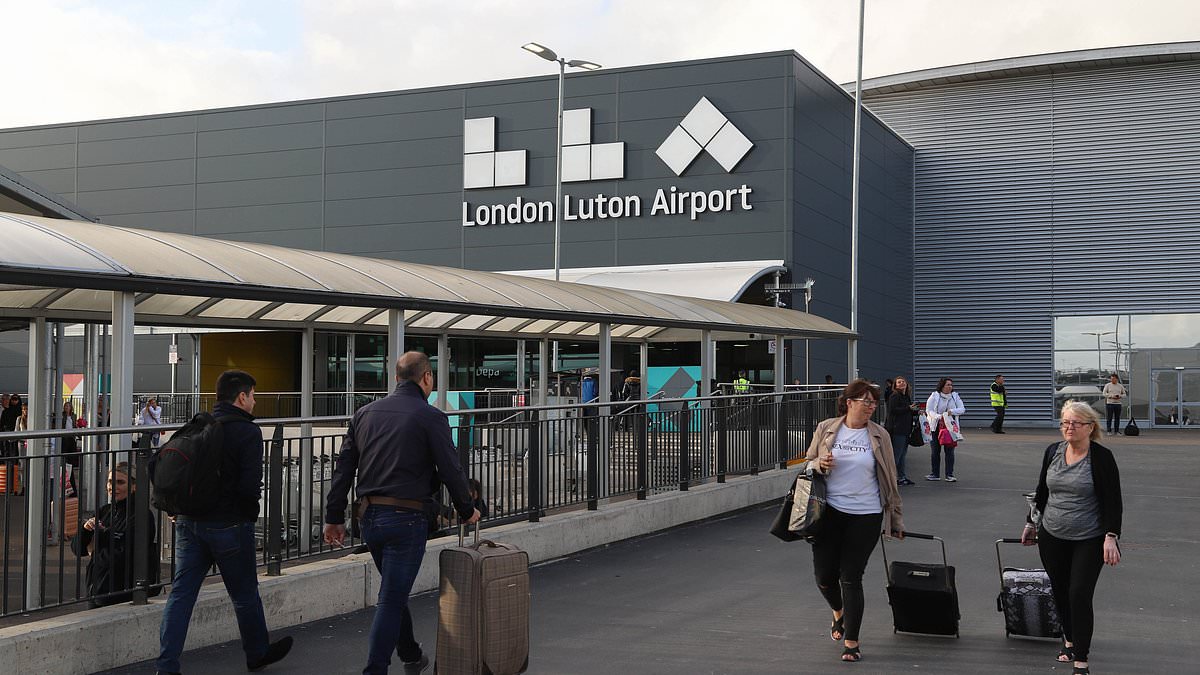Labour today approved the expansion of Luton Airport despite ministers being told to reject the plans over environmental concerns.
Transport Secretary Heidi Alexander gave the go-ahead to the Bedforshire airport’s development consent order (DCO) application.
The project is centred on raising the airport’s cap on annual passenger numbers from 18 million to 32 million by the mid-2040s.
The plans also include allowing Luton’s runway to be used for 77,000 more flights per year than last year.
In 2024, Luton was the UK’s fifth busiest airport last year with 16.9 million passengers travelling on 132,000 flights.
Those behind the project claimed there would be ‘significant economic, employment and social benefits’ for the Bedfordshire town.
But opponents claimed the Government had ignored local people in green-lighting the plans, which would ‘degrade health and quality of life’ in the local area.
DCOs are used to obtain permission for nationally-significant infrastructure projects and Luton’s has been approved as Labour continues a frantic bid for economic growth.
A Government source said: ‘The Transport Secretary has approved the expansion of Luton airport for its benefits to Luton and the wider UK economy.
‘The decision overturns the Planning Inspectorate’s recommendation for refusal.
‘Expansion will deliver huge growth benefits for Luton with thousands of good, new jobs and a cash boost for the local council which owns the airport.
‘This is the 14th development consent order approved by this Labour Government, demonstrating we will stop at nothing to deliver economic growth and new infrastructure as part of our plan for change.’
One of the roles of the Planning Inspectorate – an executive agency of the Ministry of Housing, Communities and Local Government – is to consider applications and make recommendations to the relevant Secretary of State.
Luton Airport’s DCO permits up to 209,000 flights per year.
One of the concerns expressed by the examining authority which assessed the application for the Planning Inspectorate was disruption to the ‘relative tranquillity’ of the Chilterns National Landscape.
It is understood the expansion plan would mean a plane flying over the area up to once every 15 minutes, compared with once every half an hour currently.
Expansion would involve increasing the size of its existing terminal and constructing a second terminal.
It would also require extending the Dart rail link to the second terminal, as well as new taxiways – which connect runways to terminals, hangars and other facilities – and parking facilities with access and charges based on a vehicle’s emissions.
Luton Council’s Luton Rising, which owns the airport, says the project is ‘ready to go’.
The council estimates expansion would support around 12,000 new jobs in the area and provide an additional economic benefit of £1.6billion per year.
The announcement comes less than a week after Vauxhall’s van-making factory in Luton was closed by parent company Stellantis, putting up to 1,100 jobs at risk.
Campaign group Luton And District Association for the Control of Aircraft Noise opposed the expansion application, claiming it would ‘degrade health and quality of life’, and stating ‘aircraft noise at night is known to damage health’.
Wigmore Park, which adjoins the airport, would be destroyed as part of the plan.
The airport is proposing to create ‘replacement open space’ to the east, which is ‘at least 10 per cent bigger’ than the existing park.
Alberto Martin, chief executive officer at London Luton Airport, said: ‘We welcome today’s approval from Government, which now provides Luton with a generational opportunity to transform the town and our region’s economy.
‘Once complete, these plans will generate an additional £1.5 billion for the economy every year and create up to 11,000 jobs.
‘This will put Luton at the heart of a collective mission to achieve sustainable economic growth.’
Tory MP Gareth Bacon, the shadow transport secretary, said: ‘The Government’s approval of Luton Airport’s expansion is a welcome development.
‘This decision has the potential to boost the local economy and enhance connectivity across the UK.
‘However, it is clear Labour still do not understand that backing projects that will take years to complete will not mitigate against the impacts of their punishing Jobs Tax, which will devastate the economy, kill jobs and make every working household £3,500 worse off.
‘Labour inherited the fastest-growing economy in the G7, but by talking down the economy, increasing tax levels to a record high, and undermining business confidence, they have killed growth stone dead and families are paying the price.
‘Unlike Labour, the Conservatives understand that when you harm businesses you extinguish the embers of growth.’
